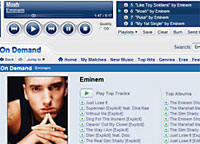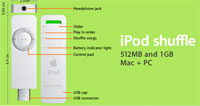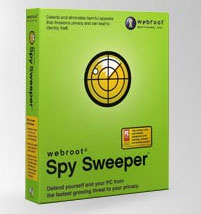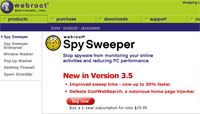 Yahoo has slapped a king-sized gauntlet on the floor as it announced plans to roll out an aggressively-priced online music service.
Yahoo has slapped a king-sized gauntlet on the floor as it announced plans to roll out an aggressively-priced online music service.
The new service, unsurprisingly dubbed Yahoo Music Unlimited, will give downloaders unlimited access to over a million music tracks for US$6.99 (~£3.70 ~€5.42) a month, or, alternatively, for US$60 (~£31.86 ~€36.58) a year.
The service, which also lets users transfer the songs to compatible portable music players, massively undercuts its rival’s services.
RealNetworks, for example, charge a comparatively hefty US$179 (~£95 ~€139) a year for a near-identical service while Napster charging US$14.95 (~£7.95 ~€11.60) a month for a portable music subscription service and US$9.95 (~£5.25 ~€7.72) a month without the portability option.
“We look at subscriptions as a way to get people to pay as little something for digital music as opposed to ripping their own CDs or stealing music.” Yahoo Music General Manager David Goldberg said.
Yahoo hopes that the low, low, low price is designed to get users hip to the subscription music model, which allows consumers to play downloaded music and “streamed” tracks whenever they want — as long as they keep shelling out for the privilege.
Just like Napster’s similar service – which offers a similarly vast online music library – the second a customer’s cash flow stops, their opulent oasis of a record collection will rapidly turns into a tune-free desert.
Yahoo’s price pruning bonanza looks set to spur further expansion of the online music business, which despite huge growth still only accounts for about 2% or less of total music sales, according to analyst estimates.
 Yahoo’s hugely popular Website – visited by 100 million US users every month – should give their music service a big head start, with the company being able to let rip with the kind of massive marketing muscle that few online music rivals can match.
Yahoo’s hugely popular Website – visited by 100 million US users every month – should give their music service a big head start, with the company being able to let rip with the kind of massive marketing muscle that few online music rivals can match.
“It’s a hugely aggressive move, a shot in the arm to the subscription notion,” says David Card, an analyst at Jupiter Research, predicting subscription revenue will be larger than downloads within a few years, from roughly equal shares today.
iTunes, the current online music market leader, provides a different service, preferring to charge users on a song or album download basis, with Apple previously being critical of the subscription model.
Some suspect that they may be pressured into adopting a similar offering once Yahoo’s PR machine rolls into action.
Although it’s generally accepted that subscription services are more lucrative than charging per download, some analysts are wondering whether Yahoo will actually be able to make any dosh at the US$60 (~£31 ~€46) annual subscription level.
Yahoo’s David Goldberg has expressed confidence that the service will be profitable, although conceded that the company could eventually raise its fees. He’s been a bit sketchy with the small-print details too, but says Yahoo will pay music labels royalties linked to its revenue and subscriber numbers for the service.
 Yahoo’s subscription service will work with selected portable MP3 players that use Microsoft’s digital-music format – there’s currently around compatible 10 devices available, including Dell’s DJ player and Creative Technology’s Zen Micro.
Yahoo’s subscription service will work with selected portable MP3 players that use Microsoft’s digital-music format – there’s currently around compatible 10 devices available, including Dell’s DJ player and Creative Technology’s Zen Micro.
Owners of compatible devices will have to install new software on them to be able to use the service, with newer models offering built-in compatibility.
Apple may be slightly perturbed to learn that the Yahoo’s service will not work with their iPod, despite it being the biggest selling digital music player on the planet and probably elsewhere.
Yahoo’s testosterone-charged move reflects their determination to grab a Brobdingnagian chunk of the online music pie, with the company splashing out US$160 million (~£85m ~€124m) last year to acquire MusicMatch, a company already offering a song/album download deal with a non-portable subscription service.
MusicMatch’s subscription charges have now come down to match the new service with Yahoo expected to merge the two services shortly.
 The new service will include free software a la Apple’s iTunes jukebox, with the bonus of letting subscribers rummage around in their friends computers for songs, and then listen to their tracks if the music is part of Yahoo’s catalogue.
The new service will include free software a la Apple’s iTunes jukebox, with the bonus of letting subscribers rummage around in their friends computers for songs, and then listen to their tracks if the music is part of Yahoo’s catalogue.
To further entice subscribers, Yahoo is looking to incorporate the social aspects of listening to and discovering music through tie-ins with other Yahoo services -like gamers on Yahoo’s site being able to listen to the same music as friends they are playing with.
Yahoo Music users not ‘down’ with this subscription thang will still be able to buy tracks under the traditional download model, with fees of 79 cents (~£0.42 ~€0.62) per song for Music Unlimited subscribers and 99 cents (~£0.53 ~€0.77) for nonsubscribers.
Yahoo
MusicMatch
 More and more people are using computers or portable players for music, even though traditional radio still leads the competition, according to a recent market study.
More and more people are using computers or portable players for music, even though traditional radio still leads the competition, according to a recent market study. Last week, Yahoo revealed their determination to become big noise in the music industry, unveiling a music subscription service that significantly undercuts their rivals.
Last week, Yahoo revealed their determination to become big noise in the music industry, unveiling a music subscription service that significantly undercuts their rivals. If you’ve ever accessed the Web through a mobile phone or PDA, you may be familiar with the annoyance of finding some sites inaccessible, hard to read or just a right royal pain in the Bluetooth.
If you’ve ever accessed the Web through a mobile phone or PDA, you may be familiar with the annoyance of finding some sites inaccessible, hard to read or just a right royal pain in the Bluetooth. “Web access today is so fundamental, that it shouldn’t be hampered by wires,” table-thumped Philipp Hoschka, W3C’s deputy director for Europe.
“Web access today is so fundamental, that it shouldn’t be hampered by wires,” table-thumped Philipp Hoschka, W3C’s deputy director for Europe. Yahoo has slapped a king-sized gauntlet on the floor as it announced plans to roll out an aggressively-priced online music service.
Yahoo has slapped a king-sized gauntlet on the floor as it announced plans to roll out an aggressively-priced online music service. Yahoo’s hugely popular Website – visited by 100 million US users every month – should give their music service a big head start, with the company being able to let rip with the kind of massive marketing muscle that few online music rivals can match.
Yahoo’s hugely popular Website – visited by 100 million US users every month – should give their music service a big head start, with the company being able to let rip with the kind of massive marketing muscle that few online music rivals can match. Yahoo’s subscription service will work with selected portable MP3 players that use Microsoft’s digital-music format – there’s currently around compatible 10 devices available, including Dell’s DJ player and Creative Technology’s Zen Micro.
Yahoo’s subscription service will work with selected portable MP3 players that use Microsoft’s digital-music format – there’s currently around compatible 10 devices available, including Dell’s DJ player and Creative Technology’s Zen Micro. The new service will include free software a la Apple’s iTunes jukebox, with the bonus of letting subscribers rummage around in their friends computers for songs, and then listen to their tracks if the music is part of Yahoo’s catalogue.
The new service will include free software a la Apple’s iTunes jukebox, with the bonus of letting subscribers rummage around in their friends computers for songs, and then listen to their tracks if the music is part of Yahoo’s catalogue. Games developers have included Internet access in their products. The best example of this is Wipeout Pure, which includes a browser, allowing the user to download new game levels and features. Since the game has a browser built-in, it can be reasonable to assume that Sony have actually put all the code to access the Internet in the PSP itself (and made it available to developers).
Games developers have included Internet access in their products. The best example of this is Wipeout Pure, which includes a browser, allowing the user to download new game levels and features. Since the game has a browser built-in, it can be reasonable to assume that Sony have actually put all the code to access the Internet in the PSP itself (and made it available to developers). Rather than everyone set-up spoof servers, some nice people have done it for you, and these then point to a PSP portal which someone has set-up PSP friendly content. You can access the spoof DNS servers by amending your Internet set-up configuration (on the PSP) and leave everything to automatic except for the DNS settings, into which you enter the spoof server settings.
Rather than everyone set-up spoof servers, some nice people have done it for you, and these then point to a PSP portal which someone has set-up PSP friendly content. You can access the spoof DNS servers by amending your Internet set-up configuration (on the PSP) and leave everything to automatic except for the DNS settings, into which you enter the spoof server settings. Once updated versions of the firmware come out, or there are 3rd party applications, the system will have all the features to be a powerful media hub. It supports WiFi, has a decent screen and video capability now, adding other Internet capabilities will just add the finishing touches to a superb product.
Once updated versions of the firmware come out, or there are 3rd party applications, the system will have all the features to be a powerful media hub. It supports WiFi, has a decent screen and video capability now, adding other Internet capabilities will just add the finishing touches to a superb product. Yahoo has pulled a fast one on its rivals by unexpectedly taking it’s
Yahoo has pulled a fast one on its rivals by unexpectedly taking it’s  Finding video content on Yahoo’s new search facility is easy enough: type in the relevant keywords and you’ll be taken to a results page showing thumbnails of the video files. Clicking on the thumbnail takes you to the hosting page with an option to directly view the video.
Finding video content on Yahoo’s new search facility is easy enough: type in the relevant keywords and you’ll be taken to a results page showing thumbnails of the video files. Clicking on the thumbnail takes you to the hosting page with an option to directly view the video. In the interests of research, we rummaged around for naughty porn, but couldn’t find anything too racy – until we spotted the ‘turn safe search off’ option. Clicking on this released a veritable cascade of filth that would send Mary Whitehouse’s graveyard residence spinning in turbo mode.
In the interests of research, we rummaged around for naughty porn, but couldn’t find anything too racy – until we spotted the ‘turn safe search off’ option. Clicking on this released a veritable cascade of filth that would send Mary Whitehouse’s graveyard residence spinning in turbo mode. T-Mobile is offering a free WiFi pilot service on Southern Rail’s busy London-to-Brighton train service in readiness for a full launch in June.
T-Mobile is offering a free WiFi pilot service on Southern Rail’s busy London-to-Brighton train service in readiness for a full launch in June. T-Mobile manager for WiFi Jay Saw was in full corporate PR spin mode as he enthused: “We are the only operator that has placed GPRS, 3G and WiFi at the centre of its strategy. That differentiates us from the competition. We’re the world’s largest network – by our own definition.”
T-Mobile manager for WiFi Jay Saw was in full corporate PR spin mode as he enthused: “We are the only operator that has placed GPRS, 3G and WiFi at the centre of its strategy. That differentiates us from the competition. We’re the world’s largest network – by our own definition.” Purring like a cat recumbing in cream, Apple CFO Peter Oppenheimer revealed that Apple’s iPod shuffle has snaffled a 58 per cent share of the flash-based digital media market in the US.
Purring like a cat recumbing in cream, Apple CFO Peter Oppenheimer revealed that Apple’s iPod shuffle has snaffled a 58 per cent share of the flash-based digital media market in the US. Positively glowing with confidence, Oppenheimer claimed that MP3 capability in handsets will be more complementary than a replacement, with handsets suffering from “a worse user interface and limited battery life,”
Positively glowing with confidence, Oppenheimer claimed that MP3 capability in handsets will be more complementary than a replacement, with handsets suffering from “a worse user interface and limited battery life,” Anti-spyware firm Webroot have produced a survey which claims that spyware – invasive programs that generate pop-ups, hijack home pages and redirect searches – generate an estimated US$2bn (~£1.05bn~€1.54bn) in revenue a year.
Anti-spyware firm Webroot have produced a survey which claims that spyware – invasive programs that generate pop-ups, hijack home pages and redirect searches – generate an estimated US$2bn (~£1.05bn~€1.54bn) in revenue a year. “Our previous Quarterly SpyAudit Reports have provided a numerical analysis of spyware’s growth, but our industry has been lacking a comprehensive resource that fully documents the spyware threat. The State of Spyware Report fills that void and delivers the most in-depth, expansive review and analysis of spyware to date.”
“Our previous Quarterly SpyAudit Reports have provided a numerical analysis of spyware’s growth, but our industry has been lacking a comprehensive resource that fully documents the spyware threat. The State of Spyware Report fills that void and delivers the most in-depth, expansive review and analysis of spyware to date.” According to a survey carried out over the Easter period by network management company, Ipswitch, a thumping
According to a survey carried out over the Easter period by network management company, Ipswitch, a thumping  According to a survey carried out over the Easter period by network management company, Ipswitch, a thumping 93% of all e-mail received was unwanted spam.
According to a survey carried out over the Easter period by network management company, Ipswitch, a thumping 93% of all e-mail received was unwanted spam.